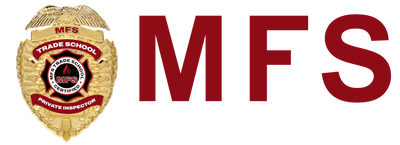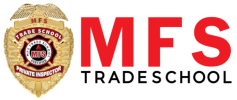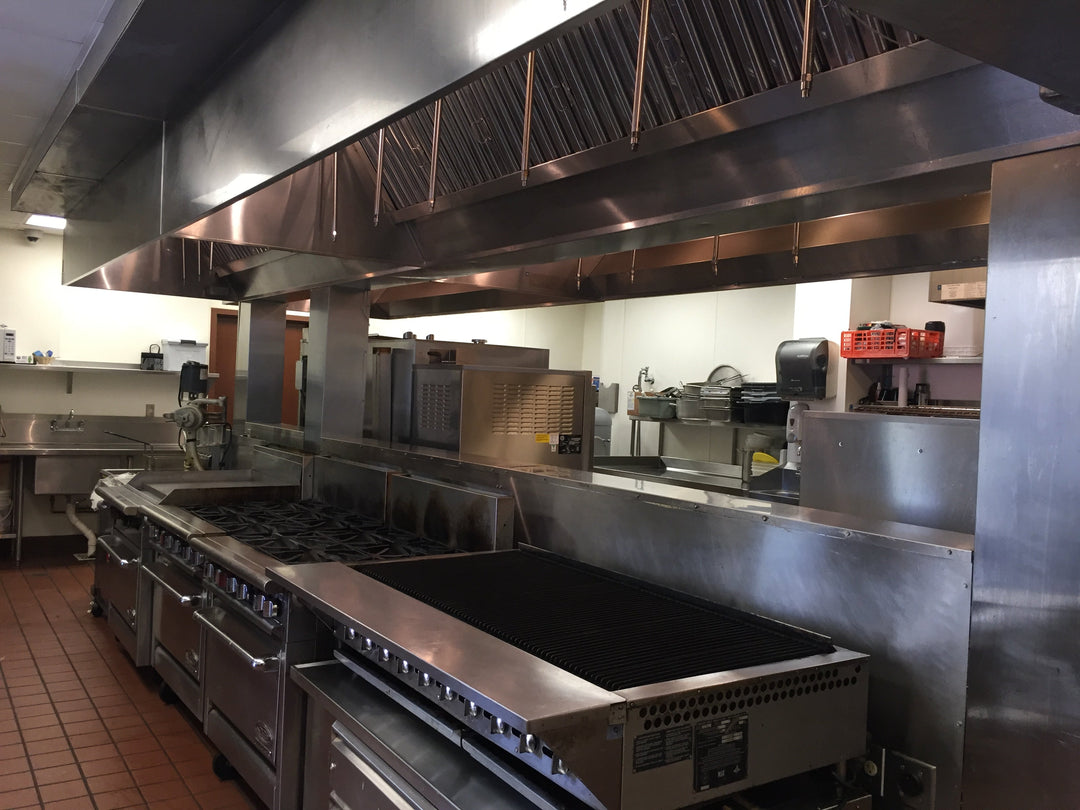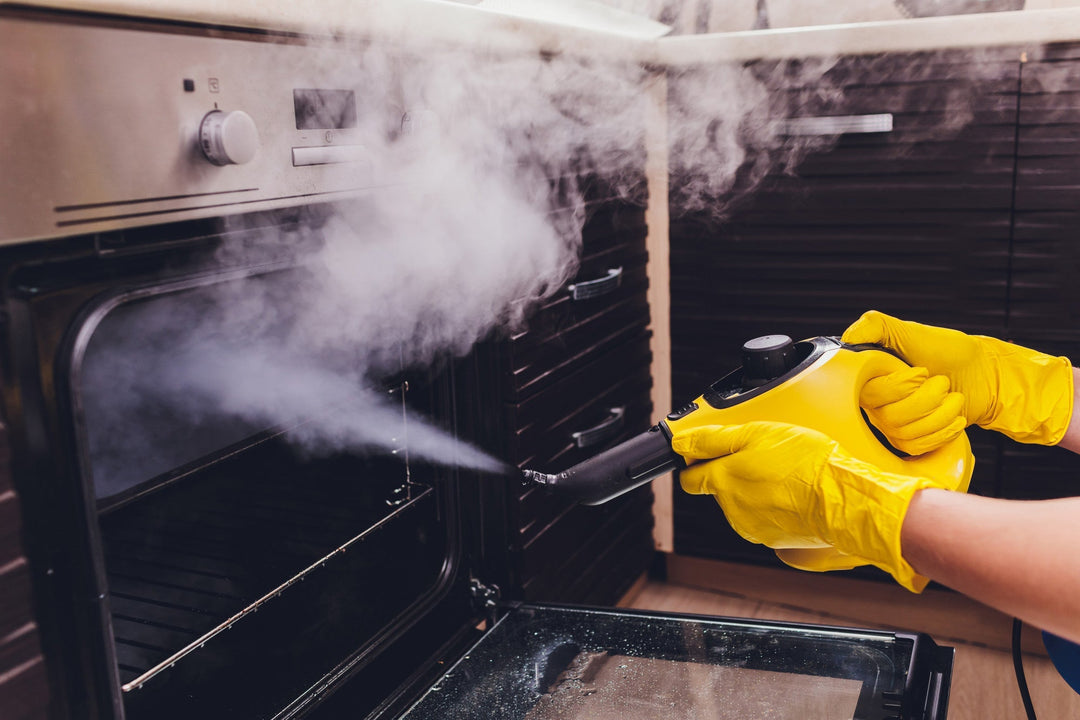How Exhaust System Cleaning Boosts Kitchen Staff Productivity
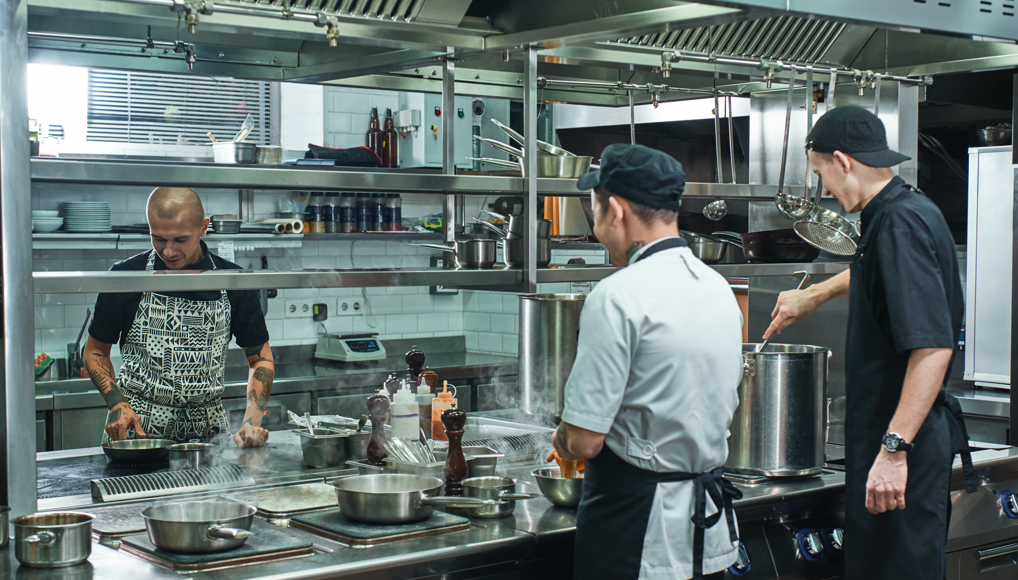
A clean kitchen exhaust system is essential for running a restaurant efficiently. It directly affects how well the staff performs and how satisfied they are in their workplace. In professional kitchen environments where every second counts, keeping the ventilation system in top shape is crucial for smooth operations.
The Benefits of Regular Kitchen Exhaust Cleaning
Regular kitchen exhaust cleaning offers several advantages that can significantly improve staff efficiency:
-
Improved Air Quality: The cleaning process eliminates harmful pollutants, smoke, and grease particles from the air, creating a healthier working environment.
-
Enhanced Safety: By reducing fire hazards and potential workplace dangers, regular maintenance ensures the safety of the kitchen staff.
-
Temperature Control: A well-maintained exhaust system helps regulate temperature levels in the kitchen, keeping it comfortable for the workers.
-
Equipment Longevity: Preventive maintenance through regular cleaning can extend the lifespan of the exhaust system, minimizing costly breakdowns that disrupt operations.
The Impact of Poorly Maintained Exhaust Systems
Restaurant kitchens produce a lot of heat, smoke, and tiny particles during food preparation. If these elements are not properly managed through regular maintenance of the exhaust system, they can create difficult working conditions that may:
-
Decrease in energy levels among staff
-
Increase stress levels in the workplace
-
Result in more sick days taken by employees
-
Lower team morale
-
Reduce overall cooking efficiency
Creating an Efficient Work Environment
When kitchen exhaust systems are cleaned regularly by professionals, it leads to an environment where staff members can carry out their tasks effectively and safely. This investment in improving workplace conditions directly translates into higher productivity levels while also ensuring long-term success for restaurant operations.
Additionally, using advanced tools like the MFS Electrostatic Misting Fogger during these cleaning sessions can further enhance the effectiveness of the entire operation.
Starting a Hood Cleaning Business
For those interested in entering the hood cleaning industry, it's important to understand the costs, training and certification requirements involved. With consistent demand driven by regulatory obligations, starting a hood cleaning business has great potential.
Trade schools like MFS Trade School play a vital role in bridging America's skills gap by offering necessary training programs and hands-on experiences for aspiring professionals in this field.
In summary, maintaining a clean kitchen exhaust system goes beyond just meeting health department standards; it plays a significant role in boosting productivity and ensuring safety for all kitchen staff members.
1. Fire Prevention: Protecting Staff Safety and Productivity
The Fire Hazard of Grease Accumulation
Grease buildup in kitchen exhaust systems poses a serious fire risk that directly affects staff safety and the smooth operation of the restaurant. According to the National Fire Protection Association, 47% of restaurant fires start from cooking equipment, with grease accumulation being a major factor.
How Regular Cleaning Can Help
To mitigate these risks, regular cleaning of exhaust systems is essential. This includes:
-
Removal of flammable grease deposits from hood surfaces
-
Cleaning of ductwork to prevent grease accumulation
-
Maintenance of exhaust fans to ensure proper grease removal
By implementing effective hood cleaning strategies for fire prevention, restaurant owners can significantly reduce the chances of a fire breaking out.
The Benefits of a Clean Exhaust System
A well-maintained exhaust system provides several layers of protection:
-
Reduced Fire Risk: Professional cleaning eliminates combustible materials that could ignite during busy cooking times.
-
Enhanced Fire Suppression: Clean systems allow fire suppression equipment to work effectively.
-
Improved Emergency Response: Clear ductwork provides better access for firefighters if needed.
The Impact of Grease Buildup on Kitchen Operations
In addition to fire hazards, grease accumulation can disrupt kitchen operations in various ways:
-
Equipment Malfunction: Excessive grease can clog components and cause system failures.
-
Forced Closures: Health inspectors may shut down facilities with dangerous grease levels.
-
Production Delays: System maintenance during operating hours impacts food service.
Keeping Staff Safe
To ensure staff safety, it is crucial to implement specific measures:
"Regular hood cleaning reduces fire incidents by up to 75% in commercial kitchens" - Fire Safety Research Institute
-
Establish cleaning schedules based on cooking volume.
-
Train staff on fire prevention protocols.
-
Regularly inspect grease levels in system components.
-
Document cleaning procedures and maintenance records.
Creating a Secure Working Environment
Taking a proactive approach to exhaust system cleaning, such as that offered by MFS Trade School, creates a safe working environment where staff can concentrate on food preparation without worrying about safety issues. Clean systems maintain optimal airflow, reducing the risk of flash fires during busy cooking periods and safeguarding both personnel and property from fire-related incidents.
Maintaining Hygiene Standards for Staff Safety
Furthermore, it is crucial not to overlook the significance of upholding hygiene standards. Integrating virus disinfecting services into regular maintenance routines guarantees that the kitchen remains free from harmful pathogens, further promoting overall staff safety and productivity.
2. Enhancing Air Quality for Better Performance and Well-being
Clean kitchen exhaust systems directly impact staff health, morale, and productivity through improved air quality. Professional cleaning, which includes cooking oil filtration, removes:
-
Airborne grease particles
-
Smoke residue
-
Cooking odors
-
Harmful volatile organic compounds (VOCs)
-
Carbon monoxide buildup
Air Quality Impact on Staff Performance
Research shows that clean air in commercial kitchens leads to:
-
15-20% increase in cognitive function
-
Reduced sick days
-
Higher energy levels during shifts
-
Improved focus during peak service hours
-
Better decision-making abilities
Health Benefits of Clean Kitchen Air
Regular exhaust system cleaning creates measurable improvements in staff well-being:
-
Reduced exposure to respiratory irritants
-
Decreased risk of occupational asthma
-
Lower instances of skin irritation
-
Minimized eye strain
-
Better sleep quality after shifts
Productivity Gains Through Clean Air
Clean kitchen ventilation systems enable:
-
Faster recovery between busy service periods
-
Sustained energy levels during long shifts
-
Clearer communication between team members
-
Enhanced taste and smell perception for quality control
-
Improved mental alertness during critical tasks
Professional exhaust cleaning, which is an essential part of restaurant cleanliness, removes accumulated grease, smoke, and pollutants that affect air quality. This investment in air quality creates a healthier work environment where staff can perform at their peak potential without fighting against respiratory discomfort or fatigue.
3. Creating a Comfortable Working Environment for Optimal Efficiency
A comfortable kitchen workspace directly impacts employee performance and job satisfaction. Research shows that kitchen staff working in well-ventilated environments demonstrate:
-
15-20% higher task completion rates
-
Reduced error margins in food preparation
-
Increased willingness to work longer shifts
-
Better team collaboration
-
Lower turnover rates
Clean exhaust systems play a vital role in maintaining optimal working conditions. Properly maintained ventilation removes:
-
Excess Heat: Prevents temperature-related fatigue and maintains staff alertness
-
Cooking Odors: Reduces sensory overload and maintains clear thinking
-
Airborne Grease: Eliminates sticky surfaces and uncomfortable working conditions
-
Steam: Improves visibility and reduces workplace accidents
Kitchen staff exposed to poor ventilation often report:
"The heat becomes unbearable during peak hours, making it difficult to focus on complex orders" "Persistent cooking odors lead to headaches and decreased motivation"
Regular exhaust system cleaning creates measurable improvements in workplace comfort:
-
Temperature Control
-
Maintains consistent cooking station temperatures
-
Reduces physical strain on staff
-
Prevents heat-related stress
-
Eliminates stagnant air pockets
-
Reduces humidity levels
-
Creates fresh airflow patterns
-
Workspace Quality
-
Keeps surfaces clean and grease-free
-
Improves equipment accessibility
-
Maintains clear sightlines
Clean ventilation systems transform kitchen environments into spaces where staff can perform their best work. Professional cleaning services ensure these systems operate at peak efficiency, creating conditions that support sustained productivity throughout long shifts.
4. Improving Equipment Efficiency: A Win-Win for Productivity and Cost Savings
Clean exhaust systems directly impact kitchen equipment performance through optimized airflow and ventilation. A well-maintained exhaust system removes heat, smoke, and airborne particles efficiently, allowing kitchen equipment to operate at peak performance levels.
Key Performance Improvements:
-
Reduced heat buildup around cooking equipment
-
Faster temperature recovery times
-
Decreased equipment strain during peak service hours
-
Enhanced air circulation throughout the kitchen space
Clean exhaust systems create a balanced air pressure environment, preventing hot spots and ensuring consistent cooking temperatures. This balance allows cooking equipment to maintain optimal performance without unnecessary strain on heating elements or cooling systems.
Energy Efficiency Benefits:
-
15-20% reduction in energy consumption
-
Lower HVAC system workload
-
Decreased equipment maintenance needs
-
Extended lifespan of kitchen appliances
Regular exhaust system cleaning removes grease buildup that restricts airflow. Restricted airflow forces ventilation systems to work harder, consuming more energy and increasing operational costs. Clean systems maintain proper airflow with minimal resistance, reducing the power needed for effective ventilation.
Equipment Performance Metrics:
-
Improved temperature control accuracy
-
Faster cooking times
-
Consistent food quality output
-
Reduced equipment downtime
The relationship between clean exhaust systems and equipment efficiency creates a positive cycle: properly maintained ventilation supports optimal equipment performance, which enables staff to work more efficiently. This efficiency translates into tangible benefits:
-
Decreased utility costs
-
Reduced equipment repair expenses
-
Minimized unexpected breakdowns
-
Enhanced cooking line productivity
Clean exhaust systems maintain proper air pressure balance throughout the kitchen, preventing issues like backdrafting or poor air circulation that can impact equipment performance and energy consumption. This balanced environment supports sustained operational efficiency while reducing unnecessary strain on kitchen appliances.
5. Ensuring Compliance with Safety Regulations: Avoiding Disruptions in Operations and Employee Well-being
Safety regulations governing kitchen exhaust systems serve as critical guidelines for maintaining optimal working conditions. The National Fire Protection Association (NFPA) 96 standard establishes specific cleaning frequencies based on cooking volume:
-
Monthly Cleaning: High-volume cooking operations using solid fuels
-
Quarterly Cleaning: High-volume cooking operations
-
Semi-Annual Cleaning: Moderate-volume cooking operations
-
Annual Cleaning: Low-volume cooking operations
These guidelines protect staff through systematic maintenance requirements, creating a structured approach to kitchen safety. Regular inspections by certified professionals ensure compliance with local health codes and fire safety standards. For instance, kitchen exhaust hood cleaning is a crucial part of this compliance.
Non-compliance impacts extend beyond legal consequences:
-
Increased workplace stress from unsafe conditions
-
Higher risk of workplace accidents
-
Reduced staff performance due to poor air quality
-
Potential health code violations leading to operational shutdowns
-
Loss of business reputation affects staff morale
Implementing a compliance-focused maintenance program delivers multiple benefits:
Enhanced Staff Protection
-
Reduced exposure to harmful airborne contaminants
-
Decreased risk of workplace accidents
-
Improved respiratory health conditions
Operational Stability
-
Prevention of unexpected health inspections
-
Elimination of costly violation penalties
-
Maintained continuous business operations
Professional Development
-
Staff training on safety protocols
-
Enhanced workplace safety awareness
-
Improved understanding of equipment maintenance
Regular documentation of cleaning schedules, maintenance records, and inspection results creates accountability while demonstrating a commitment to employee well-being. This systematic approach to compliance builds trust between management and staff, fostering a culture of safety-conscious operations.
Professional certification programs for kitchen exhaust cleaning ensure maintenance procedures meet industry standards. These certifications validate the expertise of cleaning professionals, providing assurance that safety protocols align with current regulations. Such training can be obtained through MFS Trade School's online courses, which provide comprehensive education on kitchen exhaust hood cleaning among other essential topics.
Moreover, the importance of adopting advanced virus disinfection methods in commercial kitchens cannot be overstated. With the rise of foodborne illnesses and viral outbreaks, implementing effective cleaning protocols not only protects customers but also ensures the well-being of staff members.
In addition to these practices, it's vital to understand and adhere to broader safety regulations that govern kitchen environments. For instance, the Department of the Air Force's publication on safety management provides comprehensive guidelines that can further enhance safety measures in commercial kitchens.
6. Extending Equipment Lifespan through Regular Maintenance: A Long-Term Investment in Productivity Gains
Regular maintenance of kitchen exhaust systems is an important strategy for long-term operational efficiency. Following proper cleaning practices, such as those outlined in these essential seasonal maintenance tips for kitchen exhaust systems, helps prevent the buildup of grease, debris, and contaminants that can lead to premature wear on system components.
Key Benefits of Regular Maintenance:
-
Reduced mechanical strain on motors and fans
-
Prevention of corrosion in ductwork
-
Extended lifespan of filters and other components
-
Minimized risk of unexpected breakdowns
-
Lower repair and replacement costs
A well-maintained exhaust system operates at its best, using less energy to maintain proper ventilation. This efficiency directly results in lower utility costs and fewer instances of equipment failure that can disrupt kitchen operations. The importance of preventive maintenance cannot be overstated in this context.
Impact on Daily Operations:
The connection between equipment maintenance and staff productivity becomes clear in everyday kitchen activities. Clean, well-functioning exhaust systems:
-
Maintain consistent airflow during busy service hours
-
Reduce unexpected maintenance interruptions
-
Allow staff to focus on food preparation without ventilation worries
-
Minimize downtime for emergency repairs
This is why regular equipment maintenance matters not just for kitchen exhaust systems but also for cleaning businesses that heavily depend on their equipment.
Cost-Effective Maintenance Strategies:
Professional cleaning services implement targeted maintenance protocols that protect equipment investments:
-
Systematic inspection of all system components
-
Documentation of wear patterns and potential issues
-
Early identification of necessary repairs
-
Customized cleaning schedules based on kitchen usage
These strategies are vital in creating a cycle of sustained performance. Clean exhaust systems operate more efficiently, experience fewer breakdowns, and require less frequent major repairs. This reliability enables kitchen staff to maintain consistent productivity levels without disruptions from equipment failures.
The investment in routine exhaust system maintenance pays off through longer-lasting equipment and ongoing operational efficiency. Kitchen staff benefit from dependable equipment that supports their daily tasks without unexpected interruptions or performance problems.
Moreover, it's essential to debunk some common myths about kitchen hood cleaning to understand the facts behind proper maintenance and safety procedures. Additionally, understanding HVAC efficiency in industrial settings can further enhance the effectiveness of your kitchen's ventilation system.
7.The Role of Kitchen Ventilation Systems in Supporting Staff Retention and Teamwork Culture: Beyond Individual Performance Metrics
A well-maintained kitchen ventilation system has a positive impact on the overall workplace culture. Clean and efficient ventilation systems show that management cares about the well-being of the staff, which in turn builds loyalty and reduces turnover rates in an industry known for high staff turnover. This commitment can be further strengthened by including custom video reviews from staff members sharing their experiences with the kitchen environment.
Key Cultural Benefits of Proper Kitchen Ventilation:
-
Enhanced Communication
-
Clear air allows for better verbal communication between team members
-
Reduced background noise from overworked ventilation systems
-
Improved visibility across workstations
-
Strengthened Team Dynamics
-
Shared responsibility for maintaining clean workspaces
-
Collective pride in professional kitchen standards
-
Increased collaboration in comfortable working conditions
A clean ventilation system changes the kitchen atmosphere from just functional to truly supportive. Staff members working in well-ventilated spaces report higher job satisfaction and stronger connections with their colleagues. This positive environment encourages experienced staff to mentor newcomers, creating a culture of knowledge sharing and skill development.
Impact on Staff Retention:
-
Lower turnover rates through improved working conditions
-
Increased employee engagement in daily operations
-
Higher likelihood of staff referrals for new positions
-
Stronger team bonds lead to longer tenure
Professional kitchen teams thrive when their workspace reflects high operational standards. Clean ventilation systems signal management's investment in workplace quality, encouraging staff to reciprocate with increased dedication and teamwork.
The psychological benefits extend beyond individual comfort. Teams working in properly ventilated kitchens demonstrate:
-
Improved problem-solving abilities during peak service times
-
Greater willingness to assist colleagues across stations
-
Enhanced creativity in menu development and execution
-
Increased participation in team training sessions
These collaborative advantages create a self-reinforcing cycle of positive workplace culture, where staff members actively contribute to maintaining high standards across all aspects of kitchen operations.
However, it is important to note that while proper kitchen ventilation significantly improves working conditions, there are still common safety hazards that need to be addressed to ensure a safe working environment. These hazards can include slips and trips, burns, cuts, lifting injuries, and exposure to harmful substances or environments. Addressing these issues alongside improving ventilation can create a truly optimal workspace.
To maintain these high operational standards, it's essential to use effective cleaning products like the freezer cleaner, which ensures cleanliness without rinsing and is ideal for walk-in freezers.
Conclusion
Clean exhaust systems drive kitchen staff productivity through multiple interconnected benefits. The impact extends from basic safety considerations to creating an environment where staff can perform at their peak potential:
-
Fire Safety and Risk Reduction: Regular cleaning eliminates fire hazards, allowing staff to focus on their core responsibilities
-
Enhanced Air Quality: Cleaner air leads to improved health outcomes and sustained performance levels
-
Equipment Efficiency: Well-maintained systems reduce operational costs while maximizing output
-
Regulatory Compliance: Proper maintenance prevents costly disruptions and legal issues
-
Team Dynamics: A comfortable work environment fosters better collaboration and staff retention
Restaurant owners and managers must view exhaust system cleaning as a strategic investment in their operation's success. The direct correlation between clean ventilation systems and staff productivity makes regular maintenance essential.
Take action now to protect your investment:
-
Schedule professional cleaning assessments
-
Implement routine maintenance protocols, such as using a restaurant hood degreaser for effective cleaning
-
Monitor air quality regularly
-
Train staff on proper ventilation practices
-
Document all maintenance activities
A clean exhaust system isn't just about meeting regulations—it's about creating an environment where your kitchen staff can thrive, deliver exceptional service, and contribute to your restaurant's long-term success. If you require further assistance or have inquiries about our services, don't hesitate to contact us for more information.
FAQs (Frequently Asked Questions)
How does kitchen exhaust system cleaning enhance staff productivity?
Regular cleaning of kitchen exhaust systems improves air quality, reduces fire risks, and creates a comfortable working environment, all of which contribute to increased staff productivity and morale in commercial kitchens.
What role does exhaust system cleaning play in fire prevention in kitchens?
Routine cleaning removes grease buildup that can ignite fires, thereby protecting staff safety and preventing disruptions caused by dangerous fire incidents in the kitchen.
In what ways does improved air quality from clean exhaust systems benefit kitchen workers?
Clean exhaust systems reduce respiratory irritants and unpleasant odors, leading to better health, higher morale, and enhanced job performance among kitchen staff.
How does maintaining clean kitchen ventilation systems impact equipment efficiency and operational costs?
Clean exhaust systems improve airflow and ventilation performance, reducing strain on kitchen appliances, which leads to sustained operational efficiency and lower energy consumption over time.
Why is compliance with safety regulations like NFPA 96 important for kitchen exhaust maintenance?
Adhering to safety regulations ensures a safe work environment that supports employee well-being and productivity while avoiding legal issues and operational disruptions due to non-compliance.
How does regular maintenance of kitchen exhaust systems contribute to long-term productivity gains?
Proper maintenance prevents premature wear and costly repairs of ventilation components, ensuring continuous, efficient operation that supports sustained productivity levels in the kitchen.
